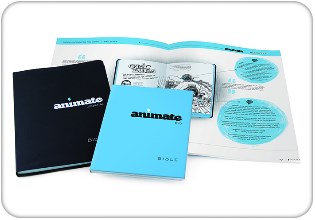 http://wearesparkhouse.org/adults/animate/bible/
http://wearesparkhouse.org/adults/animate/bible/
You can borrow this resource from our Multimedia Resource Library for 2 months. Contact gordon@pym.org.nz
Encounter scripture in new ways
Curriculum designed to reinvigorate and deepen understanding of the Bible. This is an awesome curriculum for young adults.
Website
http://wearesparkhouse.org/adults/animate/bible
Sample Session
Download (49.9MB ZIP)
The Sessions
Canon: Mining for the Word
How did these 66 cultural history lessons, collections of poems, family genograms, allegorical stories, and community letters—all gathered from sources that stretch across time and place—become the Bible? Eric Elnes describes a process of canonization that is far messier, subjective, and ongoing that we might imagine. As Eric looks into the methodology used to extract sacred “gold” from the many, many streams of writing and thought that make up the history of our faith, we discover that the shifting and refining might not be complete. What work do we need to do as we seek to uncover the richness of the Bible?
History: Parchment to Pixel
Does the way we access the Bible change the way we read and interpret the Bible? Phyllis Tickle believes this question is paramount as technology makes it easier for us to carry the Bible in our pockets or look up a verse online and out of context. By tracing the history of the Bible from its origins as a set of oral stories passed down from community to community, to the days of the Bible being read to the illiterate masses in Latin, to our current open-source approach to the Bible, Phyllis suggests that access is everything.
Testaments: One Story, Two Parts
What do we do with the Old Testament? That’s the big question for Rachel Held Evans. For a long time, Rachel was troubled by the violence, the strange laws, and the treatment of women she found in the Old Testament. She’s not alone. So how to we make sense of the images of an angry God with the God of love? How do we find the sweet spot between the Law of Moses and the Grace of Jesus? And how do we not only make peace with the Old Testament but actually find value in it? Rachel’s suggestion might surprise you.
Gospels: Unexpected Good News
We know the four Gospels tell the story of Jesus. But why do they tell different stories? Why does Matthew say one thing and John something else? What does it mean to say that the Gospels are “good news”? Nadia Bolz-Weber peels away our assumptions about the Gospels and reminds us that Jesus didn’t come to make us feel comfortable, but rather to upend our ideas about what “good news” really looks like.
Genre: Rhythm of the Text
Poetry, history, songs, letters, prophecies, even dreams—this is the stuff the Bible is made of. So why do we struggle to make sense of the various genres of biblical literature. Jose Morales suggests there’s more to understanding genre than just knowing the difference between a psalm and an epistle. We have to know how to dance with all the rhythms we find in this sacred nightclub.
Interpretation: Scripture Reads Us
There are the words on the page and then there are the words behind the words—the history, the context, the intention of the author. So is it easy to understand the Bible or not? Will Willimon gives us the tools to move beyond just reading the Bible to finding ways to make sense of what we find there. For Will, this is how we move from just knowing what the Bible says to allowing it to grab us, take hold in our hearts, and truly interpret us.
Grace: Love Is the Bottom Line
How do you love a book that’s caused you nothing but pain? Jay Bakker takes us through his journey from hard-line fundamentalist kid to faithless rebel young man to grace-filled pastor. Jay offers a new vision of the Bible for all those who have been hurt by well-meaning Christians, who have suffered at the hands of those who use the Bible to wound, who have doubted that there’s anything worth reading in a book that has brought about so much struggle.

